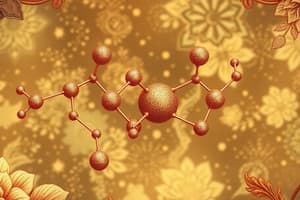Podcast
Questions and Answers
What is the significance of the word 'organic' in the context of chemistry?
What is the significance of the word 'organic' in the context of chemistry?
The word 'organic' initially signified compounds obtained from plants and animals, i.e., from living organisms.
What did Lavoisier show about the compounds obtained from plants and animals?
What did Lavoisier show about the compounds obtained from plants and animals?
Lavoisier showed that compounds obtained from plants often contained C, H, and O elements, while compounds obtained from animals contained elements C, H, N, O, S, P, etc.
What is the Vital Force Theory proposed by Jacob Berzellius?
What is the Vital Force Theory proposed by Jacob Berzellius?
The Vital Force Theory proposed by Jacob Berzellius suggested that organic compounds required a 'vital force' present in living organisms for their synthesis.
What are the elements commonly found in compounds obtained from animals according to Lavoisier?
What are the elements commonly found in compounds obtained from animals according to Lavoisier?
What was the initial definition of organic chemistry before 1828?
What was the initial definition of organic chemistry before 1828?
What did the word 'organic' signify in the early 19th century?
What did the word 'organic' signify in the early 19th century?
Who synthesized the first organic compound urea from inorganic substance in 1828?
Who synthesized the first organic compound urea from inorganic substance in 1828?
What is the branch of chemistry that deals with the study of hydrocarbons and their derivatives?
What is the branch of chemistry that deals with the study of hydrocarbons and their derivatives?
Why are the oxides of carbon, carbonates, bicarbonates, and carbides not treated as organic compounds?
Why are the oxides of carbon, carbonates, bicarbonates, and carbides not treated as organic compounds?
What type of formula represents the actual number of atoms in one molecule of the organic compound?
What type of formula represents the actual number of atoms in one molecule of the organic compound?
How is a single bond represented in a structural formula?
How is a single bond represented in a structural formula?
Who further negated the Vital Force theory by preparing acetic acid in the laboratory?
Who further negated the Vital Force theory by preparing acetic acid in the laboratory?
What are some examples of organic compounds?
What are some examples of organic compounds?
What did a detailed investigation of organic compounds reveal about their essential constituents?
What did a detailed investigation of organic compounds reveal about their essential constituents?
How many types of formulae of organic compounds are there?
How many types of formulae of organic compounds are there?
What is the formula for butane?
What is the formula for butane?
Flashcards are hidden until you start studying
Study Notes
Significance of 'Organic' in Chemistry
- The term 'organic' originally referred to compounds obtained from living organisms, such as plants and animals.
Lavoisier's Contributions
- Lavoisier showed that compounds obtained from plants and animals could be decomposed into simpler substances, such as carbon dioxide, water, and ash.
- He found that compounds from animals often contained carbon, hydrogen, oxygen, and nitrogen.
Vital Force Theory
- The Vital Force Theory, proposed by Jacob Berzelius, suggested that organic compounds could only be synthesized in living organisms, and not in the laboratory.
- This theory implied that organic compounds possessed a special 'vital force' that could not be replicated artificially.
Early Definition of Organic Chemistry
- Before 1828, organic chemistry referred to the study of compounds obtained from living organisms.
- In the early 19th century, the term 'organic' signified a connection to living things.
Synthesis of Urea
- In 1828, Friedrich Wöhler synthesized urea from an inorganic substance, contradicting the Vital Force Theory.
Branch of Chemistry
- The branch of chemistry that deals with the study of hydrocarbons and their derivatives is called organic chemistry.
Exclusions from Organic Compounds
- Oxides of carbon, carbonates, bicarbonates, and carbides are not treated as organic compounds because they do not contain hydrogen.
Formula Representation
- A molecular formula represents the actual number of atoms in one molecule of an organic compound.
- A structural formula represents the arrangement of atoms in an organic compound.
- A single bond is represented by a single line (-) in a structural formula.
Negation of Vital Force Theory
- In addition to Wöhler, other scientists, such as Liebig, further negated the Vital Force Theory by preparing acetic acid in the laboratory.
Examples of Organic Compounds
- Examples of organic compounds include sugars, fats, proteins, and hydrocarbons.
Investigation of Organic Compounds
- A detailed investigation of organic compounds revealed that they are composed of carbon, hydrogen, oxygen, and sometimes nitrogen, sulfur, and phosphorus.
Types of Formulae
- There are three types of formulae: molecular, structural, and empirical.
Formula for Butane
- The molecular formula for butane is C₄H₁₀.
Studying That Suits You
Use AI to generate personalized quizzes and flashcards to suit your learning preferences.




